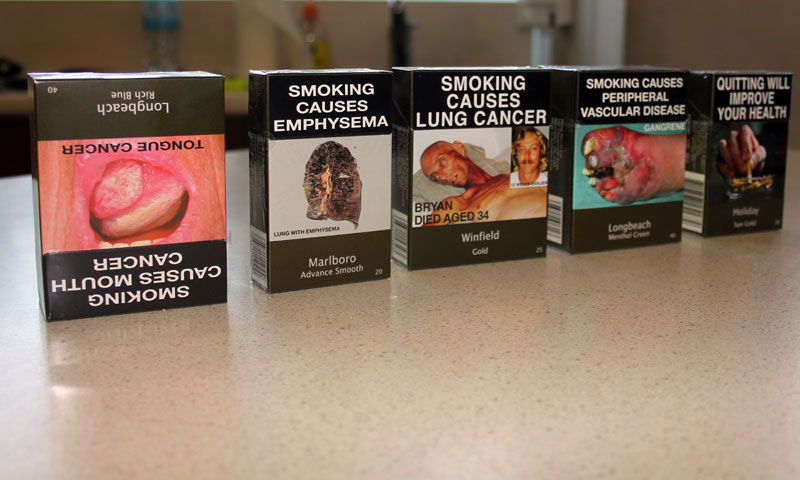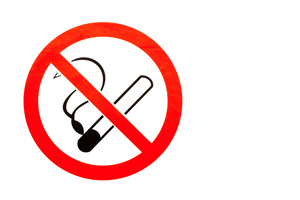Chinese researchers have reported some success in using text messages to encourage smokers to quit, according to a Xinhua News Agency story.
The results of the study published on Tuesday in the journal PLOS Medicine showed that 6.5 percent of smokers who had received a 12-week, mobile-phone-based intervention had quit by the end of the study.
The researchers at the Second Xiangya Hospital of Central South University said the intervention could prove to be more feasible and to have greater reach than in-person treatments.
The intervention had great potential to improve population health and should be considered for large-scale use in China, the researchers added.
The study was conducted as a randomized controlled trial across China from August 2016 to May 2017, among 1,369 adult smokers.
Participants were randomly assigned to a 12-week intervention consisting of either high-frequency or low-frequency messaging, or to a control group that received text messages unrelated to quitting.
At the end of the trial, 6.5 percent of those in the high-frequency group, 6.0 percent of those in the low-frequency group and 1.9 percent of those in the control group had quit smoking.
Category: People

Delivering health by text

Commended for plain packs
The World Health Organization (WHO) yesterday commended Thailand’s tobacco control measures as it prepares to become the first country in Asia to require that all tobacco products are sold in standardized packaging, according to a story in The Bangkok Post.
“Thailand’s bold steps against tobacco – the single most important cause of preventable deaths worldwide – are commendable and reflect the country’s earnest efforts to promote the health and well-being of its people,” Poonam Khetrapal Singh, regional director of WHO Southeast Asia, was quoted as saying.
The new standardized-packaging regulations comprise the Government’s latest effort to curb smoking. They add to the 2017 Tobacco Control Act, which mandated a minimum age of 20 for tobacco purchases, and banned single-stick sales and tobacco advertisements, promotions and sponsorship.
As elsewhere, the standardized packaging regulations are due to restrict the use of logos, colors, brand images and promotional information, leaving only brand names and product names displayed in a standard color and font.
The Post said that under the new law, all tobacco products would have to be sold in standardized packs by September 2019. Thailand already had graphic health warnings covering 85 percent of tobacco-product packaging, it added.
Thailand has more than 11 million smokers, with, it is estimated, one in five Thai adults smoking.
Nearly 50 percent of men between the ages of 35 and 54 smoke, while one in every six Thais between the ages of 13 and 17 uses tobacco.
All at sea over e-cigs
The US Surgeon General (SG) has said that action must be taken against electronic-cigarette use to protect the health of the nation’s young people.
In an advisory on e-cigarettes, VADM Jerome Adams said he was emphasizing the importance of protecting ‘our children’ from a lifetime of nicotine addiction and associated health risks by immediately addressing the epidemic of youth e-cigarette use.
‘The recent surge in e-cigarette use among youth, which has been fueled by new types of e-cigarettes that have recently entered the market, is a cause for great concern.
‘We must take action now to protect the health of our nation’s young people.’
The SG’s intervention was welcomed by the American Medical Association (AMA).
The AMA’s president, Barbara L. McAneny MD, said, in part, that the Association strongly supported the SG’s call for immediate action to address “the skyrocketing use of e-cigarettes by youth”.
“Given the dramatic rise in e-cigarette use amongst young people in the last year alone, it is very clear that we must all do everything we can to help reverse this epidemic,” she was quoted as saying.
“The only way to prevent another generation from developing nicotine dependence is to continue to raise awareness that e-cigarettes are harmful, powerfully addictive, and can often lead young people to smoke conventional cigarettes.
“E-cigarettes have the potential to undermine the public health gains that have been made over the years in combatting the smoking epidemic.
“We agree that parents, teachers and physicians are instrumental in reaching youth to help prevent e-cigarette use before it starts.
“We look forward to working closely with the Surgeon General’s Office to help protect our nation’s youth from e-cigarettes and the harmful nicotine they contain.”
Healthy options
Tobacco and nicotine appear at number seven on the 10 Health Recommendations for Successful New Year’s Resolutions put out yesterday by the American Medical Association (AMA).
In a press note, the AMA said that, with the new year quickly approaching, it was offering 10 recommendations to help Americans make the most impactful, long-lasting improvements to their health in 2019.
“This is the perfect time of year for each of us to consider our personal goals, and how we can make positive health choices in the coming year,” said AMA president Barbara L. McAneny, M.D.
“We encourage everyone to prioritize their long-term health by making small lifestyle changes now that can have a lasting effect in improving their health.”
Although the recommendations are aimed at ‘Americans’, most of us could all do with making some changes to our lives; so here are the 10 recommendations listed in the press note, edited slightly.- Learn your risk for type 2 diabetes and the steps you can take to help prevent or delay the onset of type 2 diabetes.
- Be more physically active. Adults should do at least 150 minutes a week of moderate-intensity activity, or 75 minutes a week of vigorous-intensity activity.
- Know your blood pressure numbers and take the necessary steps to get your high blood pressure, also known as hypertension, under control. Doing so will reduce your risk of heart attack or stroke.
- Reduce your intake of processed foods, especially those with added sodium and sugar. Also reduce your consumption of sugar-sweetened beverages and drink more water instead.
- If a health care professional determines that you need antibiotics, take them exactly as prescribed. Antibiotic resistance is a serious public health problem and antibiotics will not make you feel better if you have a virus, such as a cold or flu.
- If consuming alcohol, do so in moderation and only if you are an adult of legal drinking age.
- Talk with your doctor about tobacco and nicotine use and quit. Declare your home and car smoke-free to eliminate exposure to second-hand smoke.
- Pain medication is personal. If you are taking prescription opioids, follow your doctor’s instructions, store them safely to prevent diversion or misuse, and properly dispose of any leftover medication.
- Make sure your family is up-to-date on their vaccines.
- Manage stress. A good diet and daily exercise are key ingredients to maintaining and improving your mental health, but don’t hesitate to ask for help from a friend or mental health professional when you need it.

Drug meeting rescheduled
A public hearing on potential drug therapies to help addicted young people quit electronic cigarettes has been rescheduled, according to the US Food and Drug Administration, which issued a note through its Center for Tobacco Products.
The FDA said it had posted a notice in the Federal Register rescheduling the public hearing to January 18, at the FDA White Oak campus in Silver Spring, Maryland.
‘Individuals interested in presenting at the hearing must register by January 8, 2019,’ the note said.
‘Those interested in attending the hearing in person or watching the free, live webcast must register by January 15, 2019.
‘Anyone who previously signed up to present at or attend the canceled December 5 hearing will have to register again.’
The FDA said the deadline to submit a public comment to docket FDA-2018-N-3952 had been extended through February 1, regardless of attendance at the public hearing.
Further information, including instructions for presenters, is included in the Federal Register notice.
Hypocrisy unmasked
Despite receiving more than $27 billion in the current budget year from the tobacco settlement and tobacco taxes, the US states continue to severely underfund tobacco prevention and cessation programs proven to save lives and money, according to a statement issued by the Campaign for Tobacco-Free Kids on Friday.
‘Since the states settled their lawsuits against the major tobacco companies in 1998, our annual reports have assessed whether the states are keeping their promise to use a significant portion of their settlement funds – estimated at $246 billion over the first 25 years – to attack the enormous public health problems caused by tobacco use in the United States,’ the statement said.
‘Despite receiving huge sums from the settlement and collecting billions more in tobacco taxes, the states continue to short-change tobacco prevention and cessation programs that are proven to save lives and reduce health care costs.
‘In the current budget year, Fiscal Year 2019, the states will collect $27.3 billion from the settlement and taxes. But they will spend just 2.4 percent of it – $655 million – on programs to prevent kids from smoking and help smokers quit.
‘Meanwhile, tobacco companies spend $9.5 billion a year – $1 million every hour – to market their deadly and addictive products. This means tobacco companies spend $14 to market their products for every $1 the states spend to reduce tobacco use.
‘Our report challenges states to do more to fight tobacco use – still the nation’s No. 1 cause of preventable death and disease – to accelerate progress, address large disparities in who still smokes, and confront the growing epidemic of youth e-cigarette use in America.
‘This report is issued by the Campaign for Tobacco-Free Kids, American Heart Association, American Cancer Society Cancer Action Network, American Lung Association, Robert Wood Johnson Foundation, Americans for Non-smokers’ Rights and Truth Initiative.’
Quitting off target
Another 17,200 New Zealanders need to quit tobacco smoking each year until 2025 if the country is to reach its goal of having under five percent of the population smoking daily by then, according to a story by Amy Wiggins at nzherald.co.nz, citing the results of a new study.
The 17,200 figure is more than double the current quit rate, the study, published in Friday’s New Zealand Medical Journal, reported.
The research, headed by Professor Nick Wilson of the department of public health at Otago University’s Wellington campus, found the country was set to fall far short of the Smoke-free Aotearoa 2025 goal if the current trend continues.
It was estimated that, in line with the current trend, 17.4 percent of Māori and 7.2 percent of non-Māori people would be smoking in 2025.
To reach the 2025 target, it would be necessary to increase the number of long-term quitters by an average of 8,400 in the case of Māori and 8,800 in the case of non-Māori.
The authors estimated Quitline and funded face-to-face smoking cessation services helped 8,100 people quit each year – 2,000 Māori and 6,100 non-Māori.
That was 19 percent of the Māori quitters and 34 percent of the non-Māori quitters needed each year to reach the 2025 goal.
Based on these figures, the authors concluded that an unrealistically large increase in the use of cessation services would be needed to meet the target; so other strategies were needed.
They proposed the continuation of large tax increases on tobacco, extra funding for cessation services and advertising campaigns, and subsidies to help people switch to electronic cigarettes.
A sign of the times
The Health Department of Malaysia’s Negeri Sembilan state has denied selling ‘Dilarang Merokok’ (No Smoking) signboards at food eateries and restaurants in the state, according to a Malaysian National News Agency story.
In addition, the department has denied appointing third parties, including health officers, to sell the signboards to eateries and restaurants in Negeri Sembilan.
The chairman of the state Action Committee on Health, Environment, Co-operatives and Consumer Affairs, S. Veerapan, said members of the public and food operators should be wary of anybody claiming to be health officers and wanting to sell any product or collect donations.
New president at TFWA
Alain Maingreaud (pictured) has been elected president of the Tax-Free World Association (TFWA) for one-year, according to a TFWA press note.
Maingreaud, who was elected at a TFWA Management Committee meeting on Friday, succeeds Erik Juul-Mortensen, who stepped down this month after a 19-year tenure as president.
Four candidates stood for election.
“I am delighted and honoured to be appointed president of TFWA, especially following an election with such strong candidates,” Maingreaud said following his election. “I am very grateful for the support I have received from the Management Committee and look forward to beginning work in earnest.
“I have, of course, a hard act to follow. Erik helped create TFWA and has worked tirelessly to nurture and promote the Association and indeed the wider industry – something which I embrace and would like to continue in the same spirit.”
Meanwhile, Juul-Mortensen said it had been a “genuine honor and a privilege to serve as TFWA president”. “I wish Alain every success in this very rewarding and sometimes challenging role, and I know that he will enjoy the full support of the Board and Management Committee.
“I am proud of what TFWA has achieved during my time with the Association, and of the contribution it has made to the development of the duty free and travel retail industry. I am greatly indebted to the members of the TFWA Board and Management Committee, past and present, for their support, counsel and encouragement, through good times and bad, and for the support and friendship of TFWA’s partners around the world, notably in Cannes and Singapore, where I have many memories to treasure.
“My wider thanks go to everyone in our industry for their support during my time as TFWA President. We have the good fortune to work in a global business that is constantly challenging, continually evolving, and always rewarding. I trust that TFWA will continue to play a positive role in helping all duty-free and travel retail companies reach their full potential and encouraging all to work together to the benefit of the traveling consumer.”
E-liquid rules 'defy logic'
The owner of two vaping stores in Portland, Oregon, US, is asking a judge to throw out a state list of banned words and pictures on vaping liquid packages, according to a story by Aimee Green at oregonlive.com.
Paul Bates says the state’s “ridiculous” rules defy logic. For instance, he says in his lawsuit that the packages can’t use the words ‘apple or ‘strawberry’ even to describe the apple- or strawberry-infused liquids he sells for use with electronic cigarettes.
The same goes for pictures of apples or strawberries.
Employees at his Division Vapor stores in Southeast and Northeast Portland use white stickers to cover images on the labels that don’t comply with state rules, and that amounts to censorship and a violation of free speech, the suit contends.
“The new rules are just mind-boggling,” Bates reportedly told The Oregonian/OregonLive on Wednesday.
His suit lists the Oregon Health Authority, which is responsible for creating the banned list, as a defendant. Delia Hernandez, a spokeswoman for the agency, declined comment because of the pending litigation.
Hernandez, however, said the recent packaging rules were sparked by concern from the state lawmakers, who passed a law in 2015 requiring that packaging not be attractive to children.
In response, the Oregon Health Authority adopted a rule that said vaping liquid labels can’t depict images that might be appealing to minors – including those of “celebrities, athletes, mascots, fictitious characters” or “food or beverages likely to appeal to minors such as candy, desserts, soda, food or beverages with sweet flavors including fruit or alcohol”. This year, health officials added words, such as “tart, tangy, sweet, cool, fire, ice” and the names of fruits.
Bates, who buys his entire inventory from other companies that mostly don’t comply with Oregon regulations, said the health authority hadn’t forced him to follow the latest rules – yet.
The suit was filed in Multnomah County Circuit Court. Beaverton attorney Herbert Grey is representing Bates









